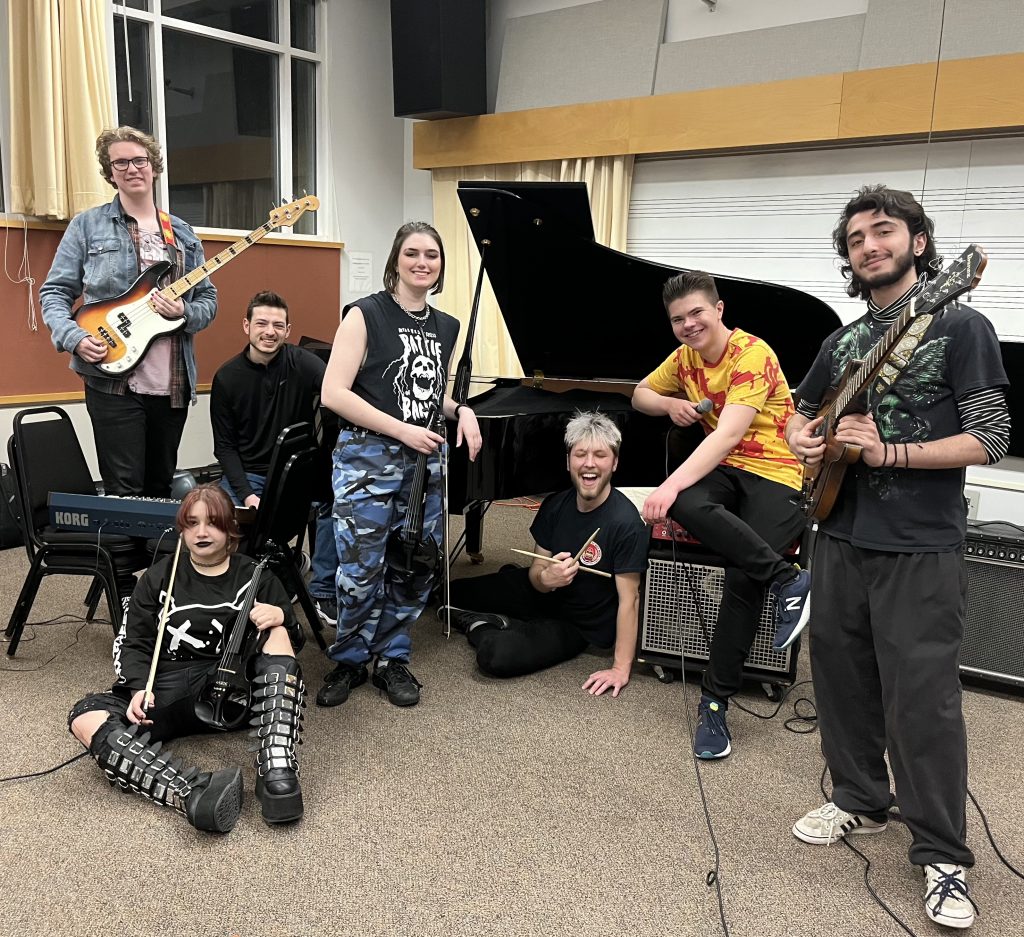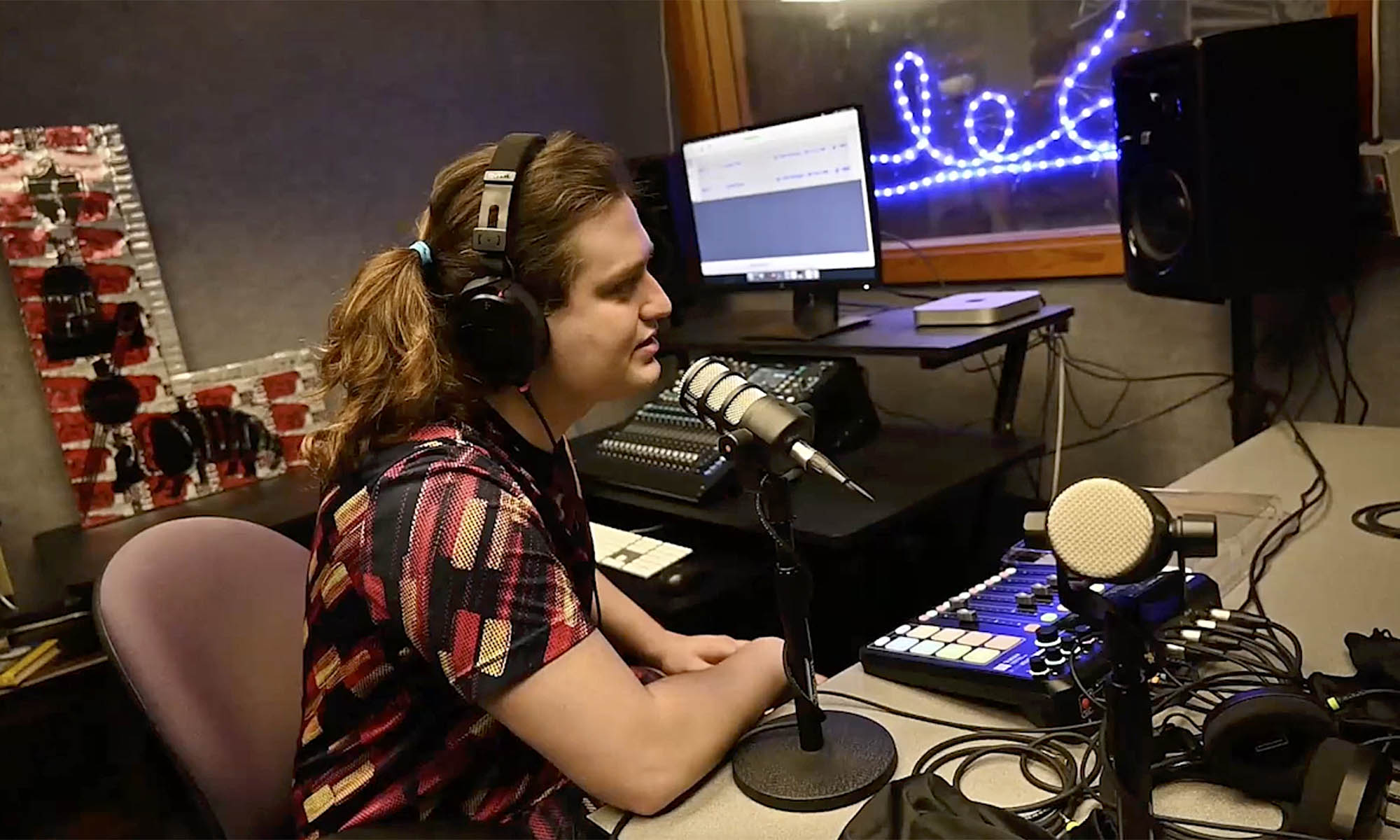By Gilliana Hope
Upon the release of their debut album, Grandeur, I had the chance to sit down with student Shane Hawkins— also know as the artist Mason Crow— to chat about his newest release, artistry, and, of course, TikTok stardom.
“Shane Hawkins is a student of Lawrence University who releases original music under the name ‘Mason Crow.’ Since the release of their debut 3-track EP, ‘WORDS TO LIVE BY,’ in February of 2022, Crow has been discovering more and more about their sound, finding their footing mostly in upbeat, electronic instrumentals, accompanied by fun, though often darker-toned, lyrics. Crow’s creative works also find their way onto TikTok, where the majority of their comedic content and following can be found. Both creative projects are alive and well, with new music and videos coming soon!”
GH: So, why Mason Crow?
SH (MC): Mason Crow is what I thought of when I was just like “I can choose any name I want, I don’t have to do Shane Hawkins” So I just liked the name Mason at the time and wanted to keep the bird theme so I just switched the bird from Hawk(ins) to Crow.
GH: Can you tell me a bit about your music-making process and you, as an artist?
SH (MC): Of course; I use the program Logic Pro X, which I found out existed through my older sibling– they were into it for a long time before I got it on my laptop. I got it and started just playing around with it pretty much… and then the playing around started actually sounding like music and I was like, “Wait what if I actually did this now?” That’s how I make instrumentals now, it’s just pretty much experimenting.
GH: Do you have anyone or anything that influenced you as an artist and specifically influenced your debut album “Grandeur”?
SH (MC): My biggest influence is The Living Tombstone. Some songs were directly inspired by them. Pretty much anything in that sort of genre– it’s kind of a weird genre to pin down– it’s like electronic with occasional rock or alternative elements. Most EDM doesn’t have vocals throughout so it’s hard to say what the genre is called exactly, but The Living Tombstone does it.
GH: Can you give a behind-the-scenes peek into your creative process?
SH (MC): My songs come from fiction; if I have a story that I want to tell I will. I find sometimes it’s better to try and tell it through song than like a novel or short story. I’m also intending to major in Creative Writing, so writing is definitely a big part of my life.
GH: Do you find that being a writer outside of music influences your songwriting or music-making process?
SH (MC): I think so, yeah, I’ve noticed it’s kind of interchangeable. I took a Creative Writing class in Winter term, and when writing poems I felt it was a very similar process to writing songs and vice versa; when I write songs it’s similar to writing poems.
GH: What was the original inspiration for “Grandeur”? Did it change throughout the process of making the album?
SH (MC): From the beginning when I first wanted to write an album it was a very different album than the one I ended up releasing. My plan as of a year ago was to make an EP called “Blood Moon”– which I did– and an EP called “Honey Moon”, which would’ve been acoustic. Then I realized I kind of hate making acoustic music. “Blood Moon” is all electronic and then I felt like I still had more songs I wanted to make, so I was like ‘I’m gonna make an album and there’s gonna be a couple acoustic songs on it but it’s mostly gonna be electronic;’ and eventually it just faded into a completely different thing than what I was initially expecting, which is what “Grandeur” is now.
GH: From your EPs to now having your debut album, do you feel your sound or voice or artistry has changed?
SH (MC): The biggest change since “Blood Moon” was that I started mixing and mastering the music myself, which is something I didn’t realize I was able to do but I feel like I figured it out fairly quickly. It’s not perfect, but by mixing and mastering it myself I’m able to get it sounding exactly how I want it. With “Blood Moon” I would end up sending very long messages about little things to the person mixing it before, so it’s very nice that now I can make it sound exactly how I want it to sound.
GH: Is there a song that particularly stands out to you as a favorite off “Grandeur”?
SH (MC): The opener and closer are the two big songs of the album; they’re twice as long as most of the others. “Share This Throne” is one of my favorites that I’ve ever written. “Immortalized”– the closing track– is part of a larger story I’ve been working on. So those are two of my favorites. “Protocol” is also really good in my opinion.
GH: How do you find that you balance the continuation of storytelling from “Blood Moon” to “Grandeur”?
SH (MC): I put “System Failure Part 2”, in the title. There was a “Part 1” on “Blood Moon”, so you can piece them together in that way. There’s also the general sound that I try to keep kind of the same. Each song I plan on having a different section of the story being told. It’s about a robot gaining sentience and realizing they’re a robot, and then beyond that, designed as a weapon. Part 1 is more about the existential part and Part 2 is more about the robot getting programmed in ways they don’t agree with…
GH: Do you pull any influence from the world around you or world at large?
SH (MC): It definitely happens from time to time. I really prefer writing just complete nonsense that has nothing to do with reality but occasionally… It’s more that an emotion I feel I’ll incorporate in, something that other people can relate to as well. My song “Butter Knife” is not really about me, but it’s about loneliness and other people who hear it can sympathize with it.
GH: Was there a particular song you found yourself struggling with a lot?
SH (MC): “Leave a Lamp On.” I wanted to challenge myself by having two verses overlapping each other.
GH: As a known TikToker, is there an intersection between ‘Mason Crow the comedian’ and ‘Mason Crow the musician?’
SH (MC): ‘Mason Crow the musician’ does not get very much attention from TikTok. I will advertise on TikTok when I release music and those videos religiously do way worse than my skit comedy. The people who follow me for comedy– for the most part, not always– follow me just for comedy. Occasionally, people will find that they really like both. Most of the time people will pick one or the other because the comedy is kind of ridiculous and the music is ridiculous too but in a different way.
You can find Shane Hawkins, aka Mason Crow, on TikTok @masoncrowofficial and listen to their debut album Grandeur on all streaming platforms.
(Some quotes have been edited for clarity and conciseness)

